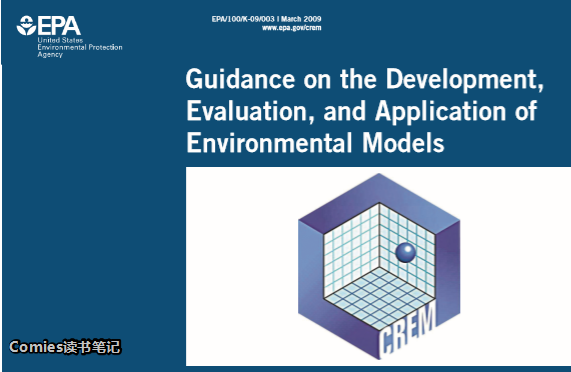《模型开发、评估、应用导则》批注:附录(4)
·[513]|1000天行动计划
读书笔记/热点追踪/论文研读/教程手册

附录A(名词解释)
False negative: Also known as a false acceptance decision errors, a false negative occurs when the null hypothesis or baseline condition cannot be rejected based on the available sample data. The decision is made assuming the baseline condition is true when in reality it is false (EPA 2000a).
错误否定: 也被称为统计学中假设检验的第二类错误,原假设是错误的,却没有拒绝原假设。一般发生于无效的假设或极限条件基于可用的简单数据条件下不该被拒绝时拒绝了。在基准条件为真,但实际上其为假的状况下进行决策。
False positive: Also known as a false rejection decision error, a false positive occurs when the null hypothesis or baseline condition is incorrectly rejected based on the sample data. The decision is made assuming the alternate condition or hypothesis to be true when in reality it is false (EPA 2000a).
错误肯定: 第一类错误,原假设是正确的,却拒绝了原假设,也就是以真为假。
Forcing/driving variable: An external or exogenous (from outside the model framework) factor that influences the state variables calculated within the model. Such variables include, for example, climatic or environmental conditions (temperature, wind flow, oceanic circulation, etc.).
驱动/强迫变量:模型外部(从模型的框架外部)因素影响模型内部计算的状态变量。这些变量包括气候、环境条件(如温度、风等)。实际上,对于模型而言是重要的边界条件,强迫条件是模型的外部动力条件,可以通俗理解为外界的驱动力。
Forms (models): Models can be represented and solved in different forms, including analytic, stochastic, and simulation.
形式(模型): 模型能通过不同的形式来进行求解,如解析方法、随机分析、模拟。
Function: A mathematical relationship between variables.
函数: 在变量之间的数学关系。
Graded approach: The process of basing the level of application of managerial controls to an item or work on the intended use of results and degree of confidence needed in the results (EPA 2002b).
分级方法:基于预期的结论和置信度等级将项目或工程的管理控制措施应用进行分级的过程。
Integrity: One of three main components of quality in EPA’s Information Quality Guidelines. “Integrity” refers to the protection of information from unauthorized access or revision to ensure that it is not compromised through corruption or falsification (EPA 2002a).
完整性:EPA信息质量导则中质量三要素之一。 “完整性”是指保护信息免受未经授权的访问或修改,以确保信息不会因腐败或伪造而受到损害(EPA 2002a)。
Intrinsic variation: The variability (see definition) or inherent randomness in the real-world processes.
内在变异:现实世界过程中的可变性或固有的随机性。
Loading: The rate of release of a constituent of interest to a particular receiving medium.
负荷:污染物组分进入受纳介质的速率。
Measurement error: An error in the observed data caused by human or instrumental error during collection. Such errors can be independent or random. When a persistent bias or mis-calibration is present in the measurement device, measurement errors may be correlated among observations (Small and Fishbeck 1999). In some disciplines, measurement error may be referred to as observation error.
测量误差:在观测数据采集过程中由于人为或者设备引起的误差。这类误差是独立且随机的。在测量设施持续的存在偏差时,其能够通过观测数据进行校正(Small and Fishbeck 1999)。在一些学科中,测量误差也指观测误差。
Mechanistic model: A model whose structure explicitly represents an understanding of physical, chemical, and/or biological processes. Mechanistic models quantitatively describe the relationship between some phenomenon and underlying first principles of cause. Hence, in theory, they are useful for inferring solutions outside the domain in which the initial data were collected and used to parameterize the mechanisms.
机理模型:模型的内在结构通过现有的物理、化学或生物过程显性的表达。机制模型定量地描述了某些现象与潜在的主要原因之间的响应关系。 因此,理论上说,在具备初始数据和参数化的过程条件下,机理模型求解区域外的解是十分好的工具。
Mode (of a model): The manner in which a model operates. Models can be designed to represent phenomena in different modes. Prognostic (or predictive) models are designed to forecast outcomes and future events, while diagnostic models work “backwards” to assess causes and precursor conditions.
模式\模型:模型运作的行为。 模型可以设计为表示不同模式的现象。 预测类模型旨在预测结果和未来事件,而诊断模型用于“回看”之前状况和解释其原因。
Model: A simplification of reality that is constructed to gain insights into select attributes of a physical, biological, economic, or social system. A formal representation of the behavior of system processes, often in mathematical or statistical terms. The basis can also be physical or conceptual (NRC 2007).
模型:现实的抽象简化,旨在深入了解所选的物理,生物,经济或社会系统的特性。 系统过程行为的正式呈现,通常以数学或统计术语表示。 其基础也可以是物理的或概念的表达(NRC 2007)。
Model coding: The process of translating the mathematical equations that constitute the model framework into a functioning computer program.
模型编程:将构建模型的内在数学方程转变为计算机语言的过程。
Model evaluation: The process used to generate information to determine whether a model and its results are of a quality sufficient to serve as the basis for a regulatory decision.
模型评估:评估以确定模型及其结果质量是否足以作为支撑管理决策的过程。
Model framework: The system of governing equations, parameterization, and data structures that make up the mathematical model. The model framework is a formal mathematical specification of the concepts and procedures of the conceptual model consisting of generalized algorithms (computer code/software) for different site- or problem-specific simulations (EPA 1994b).
模型框架:构成数学模型的控制方程,参数化和数据结构的系统。 模型框架是由用于不同区域或特定问题的模拟的通用算法(计算机代码/软件)组成的概念模型的过程和概念的数学规范(EPA 1994b)。
Model framework uncertainty: The uncertainty in the underlying science and algorithms of a model. Model framework uncertainty is the result of incomplete scientific data or lack of knowledge about the factors that control the behavior of the system being modeled. Model framework uncertainty can also be the result of simplifications necessary to translate the conceptual model into mathematical terms.
模型框架不确定性:模型的底层基础科学和算法的不确定性。 模型框架的不确定性由不完整的科学数据或被建模系统的控制因素的过程缺失所引起的。 模型框架不确定性也可能是将概念模型转换为数学方程时因简化造成的。
Module: An independent or self-contained component of a model, which is used in combination with other components and forms part of one or more larger programs.
模块:模型的独立或自成功能的组件,与其他组件组合构成一个或多个较大程序的一个子功能块。
Noise: Inherent variability that the model does not characterize (see definition for variability).
噪声:模型没有表征的固有可变性(参见可变性的定义)。
Objectivity: One of three main components of quality in EPA’s Information Quality Guidelines. It includes whether disseminated information is being presented in an accurate, clear, complete and unbiased manner. In addition, objectivity involves a focus on ascertaining accurate, reliable, and unbiased information (EPA 2002a).
客观性:EPA信息质量导则质量评估三要素之一。它包括是否以准确,清晰,完整和无偏见的方式呈现传递信息。此外,客观性还涉及确定准确,可靠和无偏见的信息(EPA 2002a)。
Object-oriented platform: A type of user interface that models systems using a collection of cooperating “objects.” These objects are treated as instances of a class within a class hierarchy。
面向对象平台:使用一组可操作的“对象”对系统进行建模的一种用户界面类型。这些对象被视为类层次结构中的类的实例。
Parameters: Terms in the model that are fixed during a model run or simulation but can be changed in different runs as a method for conducting sensitivity analysis or to achieve calibration goals.
参数:模型中的术语,在模型运行或模拟过程中是固定值,但可以在不同的运行情景中改变值,从而进行灵敏度分析或实现校准。
Parameter uncertainty: Uncertainty (see definition) related to parameter values.
参数不确定度:与参数值相关的不确定度(参见定义)。
Parametric variation: When the value of a parameter itself is not a constant and includes natural variability. Consequently, the parameter should be described as a distribution (Shelly et al. 2000).
参数变异性:当参数本身的值不是常数且包括变异性时,该参数应描述为概率分布(Shelly等,2000)。
Perfect information: The state of information where in which there is no uncertainty. The current and future values for all parameters are known with certainty. The state of perfect information includes knowledge about the values of parameters with natural variability.
完美信息:不包含不确定的信息状态。所有参数的当前和未来值都是确定的且已知的,完美信息的状态包括有关参数值的变异性的所有知识。
由于教程系列文章需要花费很多时间,难免出错,而这里不能进行后续完善,所以推荐大家关注我的博客,获取最新的修正和补充。 公众号的社群同步开启,感兴趣可在公众号对话框回复“社群”,获取群号和加入方式。
参考文献: [1] Gaber N, Foley G, Pascual P, et al. Guidance on the development, evaluation, and application of environmental models[J]. Report, Council for Regulatory Environmental Modeling, 2009, 81.
 微信公众号 | 水环境编Cheng长
网 站 | comieswater.com
微信公众号 | 水环境编Cheng长
网 站 | comieswater.com
2019-6-12



